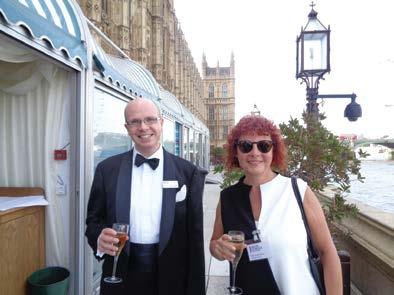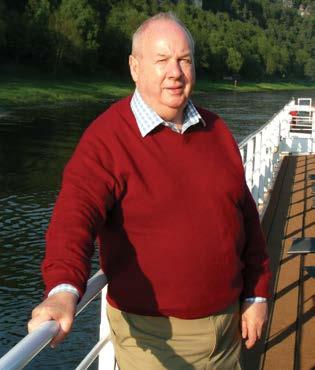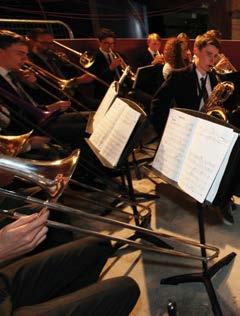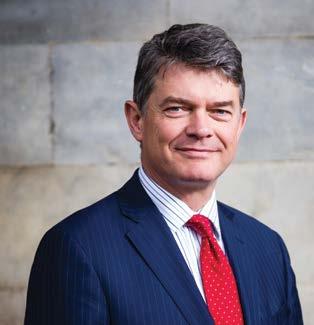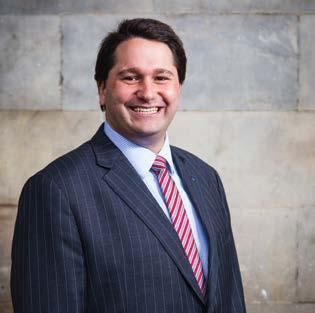
3 minute read
Christina Lawrie: Dundee Inver Discs
with Christina Lawrie, professional musician and former pupil, class of 1992
We invite all interested parties to submit their Dundee Inver Discs to our archive.
Castaways must select eight records, providing as much detail as they wish with respect to preferred interpretation and the reasons for their choice. They are provided with a copy of the Complete Works of William Shakespeare and their chosen Bible or philosophical text. Over and above this they may select one book (omnibuses are acceptable) and one luxury, for which practicalities of transport or quantities are not of concern, (pianos and ‘lifetime’s supply of X’ are perennially popular choices), however the luxury cannot be another person.
1
2
3
4
5 J.S. Bach – Mass in B minor, recorded in 1985 by the conductor Sir John Eliot Gardiner with the Monteverdi Choir and English Baroque Soloists. A superlative interpretation, with the added bonus that my friend and colleague Stephen Varcoe is the bass soloist. This would be my choice if I were to be allowed only one CD.
Mozart – The opera, Don Giovanni, conducted by Carlo Maria Giulini in 1959 with the Philharmonia Orchestra and a dream team of a cast, including Eberhard Waechter as the Don, Elizabeth Schwarzkopf as Donna Elvira, Joan Sutherland as Donna Anna and Graziella Sciutti as Zerlina.
As an undergraduate at Cambridge, I attended an inspirational series of lectures on “Operas of the Enlightenment”, which had a particular focus on the Mozart operas, Don Giovanni, Le Nozze di Figaro, Cosi Fan Tutte and Die Zauberflöte. Since then, these operas have been on my Dundee Inver Disc list. I had the great privilege of playing for Graziella Sciutti’s classes in Italian Song at the Royal College of Music, so this recording of Don Giovanni is particularly close to my heart.
Chopin – Piano Concerto in E minor, with Krystian Zimmerman, piano. Carlo Maria Giuilini, conductor. Los Angeles Philharmonic. Beautiful, dreamy and sublime.
Beethoven – Symphony no. 9 “Choral”, recorded by John Eliot Gardiner and the Orchestre Révolutionnaire et Romantique. Beethoven expressed his Utopian idealism in this celebrated symphony, which includes the famous “Ode to Joy”, nowadays the anthem of the European Union.
Rachmaninov plays Rachmaninov (The Ampico Piano Recordings). Early in the 20th century, the player-piano was being developed by several competing piano companies. Pianists could hear their performances being played back to them via piano rolls on mechanical pianos. Ampico (American Piano Company) invited Rachmaninov to make some recordings with them. On completion of the recording process, Rachmaninov was invited into the studio and sat listening to them for the first time, looking unimpressed, as the nervous Ampico executives looked on. To their relief, 6
7
8 he announced “Gentlemen, I have just heard myself play.” This apparently caused Ampico’s stock to rise rapidly on Wall Street!
Schoenberg “Pierrot Lunaire”, conducted by Simon Rattle and the Nash Ensemble. The soprano, Jane Manning, narrates the poems in the Sprechstimme style. For me this is one of the finest recordings of this fascinating and weird work from Schoenberg’s Expressionist period.
Brahms Piano Quartets, recorded by the Beaux Arts Trio and Walter Trempler. This sparkling recording brings out the sweetness and beauty of Brahms’ chamber music, as well as its rhythmic drive and textural complexity. Brahms is often described as a classicist in a romantic age, and yet Arnold Schoenberg wrote a whole essay explaining why Brahms paved the way for modernists! To sum Brahms up in a few words, the adjectives “nostalgic”, “yearning” and “passionate” come to mind.
Mozart – Great Mass in C minor. Neville Marriner and the Academy of St. Martin in the Fields. I discovered this recording when I was still at school, and fell in love with it.
Book – Dr. Zhivago It is so difficult to choose just one book. After much thought, I have chosen Dr. Zhivago by Boris Pasternak. In the tradition of the great Russian novelists, Pasternak wrote on an epic scale. The eternal theme of great love is set in the tumult and tragedy of the Russian revolution. The reader is drawn into the helplessness of the protagonists, caught up in the sweep of history. Russia herself is like another character in this novel, the vastness of the landscape being an integral part of the narrative. This is a novel of great heart and tenderness, in which the beauty of small things is set in sharp focus against the march of history and geopolitics.
Luxury – a Steinway Model D grand piano. (Can I bring a piano tuner too?)


